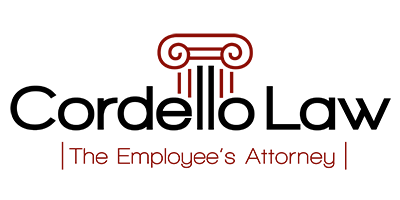What Cordello Law Does Best
Employment and Labor Law Services in Rochester, NY
Cordello Law PLLC offers a full range of employment and labor law services to help employees in Rochester, NY protect their rights and seek justice. I have extensive experience handling cases related to wrongful termination, sexual harassment, severance issues, and more.
Explore the areas of expertise offered by Cordello Law and discover how I can assist you in resolving your workplace issues.
Wrongful Termination
Illegal employment termination.
Sexual Harassment
Unwanted sexual advances or behavior in the workplace.
Whistleblower & Retaliation
Negative actions against an employee who reported illegal or unethical behavior in the workplace.
Disability Accommodation
Failure to accommodate an employee's disability.
Pregnancy Discrimination
Unlawful treatment of an employee or job applicant based on their pregnancy or related medical conditions.
Unpaid Wages
Not being paid for all the hours you work including overtime, misclassification, or not being the appropriate wage.
Hostile & Unsafe Work Environment
A workplace in which an employee is subjected to discriminatory behavior, harassment, or unsafe working conditions.
Leave of Absences
Legal issues related to taking leave including paid family leave and family medical leave (PFA & FMLA).
Bonuses & Commission
Issues related to an employee's entitlement to bonuses or commissions.
Severance & Non-compete Agreements
Legal issues related to severance packages and agreements, including non-compete agreements.
Union Disputes
Legal issues related to union arbitrations and grievance procedures.
Employment Discrimination
Unlawful treatment of an employee or job applicant based on their race, religion, age, gender.
One Step Ahead
Why Choose Cordello Law
01
Effective
My track record of success speaks for itself - I have helped numerous clients receive the justice and compensation they deserve.
02
Professional
I understand the sensitive nature of workplace issues, and am committed to providing professional and confidential legal services to protect your privacy and ensure your peace of mind.
03
Experienced
With over 20 years of experience in employment law, I have the knowledge and expertise to handle even the most complex cases.
What My Clients say
Important Things You Should Know
QUESTIONS & ANSWERS
You should contact an employment lawyer if you believe your workplace rights have been violated, or if you are uncertain about your legal rights and options as an employee.
We handle a wide range of cases related to workplace issues, including discrimination, harassment, wrongful termination, wage and hour disputes, and workplace safety violations.
The statute of limitations for employment lawsuits varies depending on the type of case and the state in which the lawsuit is filed. It’s important to consult with an employment lawyer as soon as possible to understand your legal rights and any important deadlines that may apply.
The length of time it takes to resolve an employment lawsuit depends on the specific circumstances of the case, including the complexity of the issues involved, the court’s schedule, and the willingness of the parties to negotiate a settlement.
The cost of hiring us for employment law services varies depending on the nature of the case. In some cases we charge an hourly rate, we may also work on a contingency fee basis or offer a flat fee for certain services.
Wrongful termination occurs when an employer fires an employee in violation of the law, such as in cases of discrimination or retaliation.
No, it is illegal for an employer to retaliate against an employee for reporting workplace harassment or discrimination. If you believe you have been retaliated against, you should contact an employment lawyer to discuss your legal options.
To protect your rights as an employee, it’s important to understand your legal rights and options, keep detailed records of any workplace issues or violations, and consult with an experienced employment lawyer if you believe your rights have been violated. Additionally, it’s important to speak up and report any workplace issues or violations as soon as possible, and to document any retaliation or adverse actions taken by your employer in response.
Get Help for Your Workplace Issues
As an experienced employment lawyer, I'm here to help you address your workplace issues, such as discrimination, harassment, or wrongful termination. Fill out the form below to learn about your legal options.
Disclaimer: I advise against using your employer's computers and email accounts when communicating with me. Email communication with me may not be protected by the attorney-client privilege
